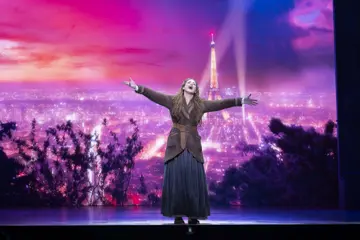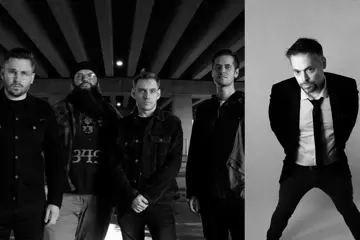ALI’S WEDDING

“It’s like the Wog Boy of the ’10s”. I wrote this to a homie after seeing Ali’s Wedding. It was, for sure, meant as a criticism; a reductive phrase that flags the film’s artlessness, its lack of ambition, its safe ‘multicultural Australia’ comedy.
But, for some people, that reductive phrase could just as easily be read as a recommendation. In fact, taken in isolation, it doesn’t sound that different from some pull-quote slapped on a promotional poster. After all, The Wog Boy was, on its 2000 release, a box office success that happily played in multiplexes. And, given the perennial handwringing over the financial failure of local films and the Australian film industry’s inability to court broad audiences, there could be far worse fates for Ali’s Wedding.
And, by all measures, it looks set to find a willing, welcoming audience: it won the Audience Award at the Sydney Film Festival, finished second in the Audience Award at the Melbourne International Film Festival, won MIFF’s Age Critics Award for Best Australian Feature, and just scored $100,000 by winning the grand prize at CinefestOZ. The film is, surely, winning people over, due to be regarded as a bona fide crowdpleaser.
But, here’s the way it pleases the crowd: by delivering the broadest of comedy, a parade of two-dimensional comic caricatures and ethnic stereotypes, telegraphed dramatic developments, a blatantly instructive score (comedy = jaunty pizzicato strings), and even panto-worthy villains.
Don't miss a beat with our FREE daily newsletter
In an illustrative example of people remembering their own lives as genre movies (like, say, high-school years as ribald teen-movie, when really they were far closer to some Frederick Wiseman portrait of tedious institutionalisation), writer/star Osamah Sami takes his own experiences —some, truly, stranger than fiction— and fashions them into a direly-predictable romantic comedy; directed with flat, unimaginative televisual blandeur by Jeffrey Walker.
Ali’s Wedding hits every rom-com story beat with the depressing regularity of a metronome: the lie the man tells when courting the woman; the revelation when his secret comes tumbling out; the down-moment montage and paid penance; and, finally, the grand public show of love at an airport. And, because it’s based on true events, the end credits have to give us a parade of pics of the real people; one of my least-favourite biopic tropes now de rigueur for any film adapting a true story.
Here, Sami plays himself, which means that a middle-aged man is attempting to pass off as his 18-year-old self. Growing up in Melbourne’s suburban Northwest, he’s the son of the benevolent local cleric (Don Hany, battling with both false beard and wonky accent), whose expectations are that his son will become a doctor, and enter into an arranged marriage.
The drama —and comedy— that ensues brings the staple of migrant stories: the battle between the older and younger generations, the motherland and the new country, the minority community and the majority culture. Some local ways —supporting Essendon, swearing, potato cakes from the fish & chip shop, pies from the servo— have been taken on without question. More liberal social values require more navigation and negotiation.
Ali’s Wedding is striking a chord, both critically and socially, for being a portrait of a community; for inviting a broad audience into the world of Muslim-Australians. With Sami writing the script (alongside TV vet Andrew Knight), it’s an example of an ‘outsider’ voice getting to tell their own story. Ali’s Wedding presents this tight-knit ex-pat community without commentary or judgment; even though, in some cases —like presenting a man with three faceless, head-to-toe-shrouded wives as dottering old comic-relief, rather than symbol of horrifying patriarchal oppression— maybe a dose of judgment would be good.
At a time in which Islamophobia persists in both society and the media, there’s something noble about Sami’s desire to bring audiences into this world; to find similarity, humanity, and empathy by telling his tale in a universal way. But, for a film critic, there’s a far nobler goal that you wish Ali’s Wedding could live up to: being not just a good idea, but a better movie.
GIFTED

Oh look, it’s a precocious child! Mckenna Grace may only be seven (“I’m only seven!” she says aloud, instructively), and have no front teeth, but she’s sassy, smart-mouthed, blessed with impeccable comic timing, able to banter with adults like a screwball heroine, and, oh yes, an MIT-worthy theoretical-mathematics genius! What’s she doing, then, living in a bug-strewn trailer-park on the swampy Florida coast with Chris Evans? A man who is described herein, in so many spoken-aloud words, “the quiet, damaged hot guy”?
Evans —unshaven, fond of drinking, a man fixing things with grimy hands— is, it’s soon explained, attempting to give this child prodigy a normal childhood; repeating the refrain that he wants to let her be a kid, not a human calculator. He’s her uncle, raising an orphaned child after the suicide of his sister. A regular ol’ crowdpleasin’ Sundance drama would take this as enough, slowly building to the revelations of why this mum killed herself, what dark secrets lay in the family past. And, sure, Gifted does that, but Tom Flynn’s screenplay also has another dire genre on the cards: the courtroom drama!
Out of the wilderness arrives Lindsay Duncan, the previously-absent grandmother of our precocious child; Captain America having a posh British mother! From there, Flynn lays out a custody battle along crude class lines: England vs America, Massachussets vs Florida, North vs South, old money vs rural folksiness, ivory tower vs salt-of-the-Earth, ivy institutions vs public schools, obsessive devotion vs chillaxin’, emotional repression vs emotional expression.
The performances —especially by debutante Grace, who makes her screenwriter’s fantasy feel like an actual human; a real living, breathing child— are top-shelf, there’s some moments of real moral quandary, and instances where the idea of using a child as expression of your own values and/or family rivalries is taken down with due criticism.
But, mostly, director Marc Webb —here paying low-budget penance after his two awful Amazing Spider-man movies— just lays it on real thick. There’s children speaking themes aloud, pandering use of sentimental folksongs, much handwringing about the wellbeing of a child, a one-eyed cat named Fred, dappling sunlight for things-are-going-great montages, and rain when it’s in the bad times. Where Gifted is, in many ways, better than expected, the moments openly employing cheap, cheesy, genre-movie devices —which only multiply as the film progresses— manage to leech away most of the goodwill that’s been won.
THE LOVERS

The Lovers is a film that promises little, but delivers a lot. Its sitcom premise is as follows: 50-something Debra Winger (Debra Winger!) and Tracy Letts are a married couple both engaged in simultaneous affairs with younger lovers. They escape from the office for thrilling trysts —with Aiden Gillen’s prickly, macho writer and Melora Walter’s snarling ballerina, respectively— then come home, and make stilted small-talk over glasses of wine. They’re the model of a disinterested couple; watching TV from either end of the couch, reading books in bed, bustling off the work with barely a goodbye. Each promises their lovers that their marriage will soon be over, but it’s not over yet. They’re staying together not just out of habit, but, because of something else. And, so the hook goes, they soon start sleeping together, again.
This sounds, admittedly, pretty awful. But director Azazel Jacobs —the son of experimental filmmakers Ken and Flo Jacobs— plays the set-up not for cheap laughs, but explores it, poking at its edges. The ‘joke’ here is that, after so long in deep in their affairs, when this husband-and-wife start sleeping together again, it’s like they’re cheating on their lovers. But The Lovers takes this idea and runs with it, exploring the things that each of its leads can get from either relationship, as well as, of course, poking at the notion of the grass being forever greener, people being forever restless, dissatisfied.
It’s a film not about comic contrivance, but human behaviour. This becomes clear in an amazing scene in which the couple’s college-age son (Tyler Ross), having returned to the family nest, totally loses his shit, in a fashion disproportionate to the situation, and contrary to the breezy comic tone. His actions don’t sit in the film easily, if only because they suggest endless drama outside of the neat confines of the narrative, a whole family dynamic that’s existed long before we were around; a history that plays out in interaction, but is never spelt out in exposition.
THE DINNER

In a film called The Dinner, you feel like you know what’s going to be served. Two couples —Steve Coogan and Laura Linney, Richard Gere and Rebecca Hall— gather at a haute-cuisine restaurant. And, sure enough, secrets and lies are going to come spilling out! Their kids were involved in a dark, disturbing incident involving the death of a homeless woman, and there’s a cover-up to covered up. It could either be the stuff of titillating revelation, or, indeed, some Hanekean portrait of youthful cruelty, social culpability, and bourgeois hypocrisy.
Only, Oren Moverman —adapting a much-adapted Dutch novel— rarely lives up to the set-up, never sitting still at the table. Instead, the film freewheels through flashbacks; touring, through the years, into the unreliable psyche and erratic behaviour of Coogan. The theme of mental illness is spoken aloud, but watching Coogan’s fidgety, babbling performance doesn’t much feel like an exploration of the issue, more like watching an actor trying to stretch his dramatic range.
What results is a film that doesn’t quite sit together. It’s not just the way that the sombre, moral tone clashes with the satirical depiction of pernickety modern cuisine, nor the way the flashbacks feel more discursive than illustrative. It’s that Moverman seems fearful of really digging into the dark, lurid themes. The fact that the set-up evokes Haneke —that master of cinema— only makes for one long, unflattering comparison; Moverman lacking the mettle, and the cruelty, to really hammer The Dinner home.















